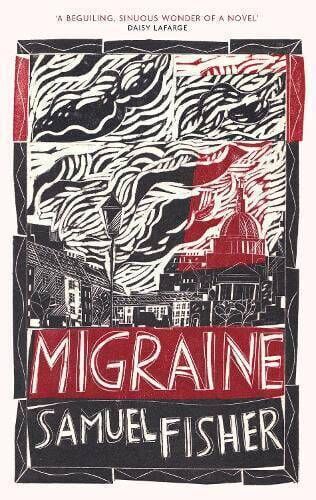Migraine, Samuel Fisher’s third novel, is short, tense, and punchy.
The story follows two male characters, Ellis and Sam, as they travel on foot across a post-apocalyptic London in a chaotic but determined pursuit of Luna, the love of Ellis’s life.
The scene for the story is set early in the first chapter. This London is a city devastated by climate change: a years-long freeze that induced the breakdown of government and society, followed by a thaw where social cohesion is attempting to reassert itself amongst the ruins.
All public buildings are abandoned and derelict. People live wherever they can find shelter, surviving through bartering, scavenging, and stealing, with violence an ever-present threat.
The extreme changes in weather cause most of the population to have regular, severe, utterly debilitating migraines; usually at the onset of a thunderstorm. Ellis is one of the lucky few who are immune, until now.
While out running, he is suddenly and inexplicably struck with a pain “like a hot welt … a single point of light” and in desperate need of a place to rest until the episode passes. With ruined and boarded-up buildings all around him, he spots a window that he can climb into.
He finally wakes in darkness, “head ringing like a struck bell”, in what used to be a book shop. The man standing over him is its former owner, Sam.
This extreme experience forces Ellis to a moment of reckoning and he decides that he has to try reconnect with the love of his life. Sam, perhaps because of boredom, perhaps for other reasons, decides to tag along.
So, Ellis and his newly acquired sidekick set out on their quest. As they travel through a broken urban landscape, chapters alternate between the present and flashbacks that describe Ellis and Luna’s relationship.
It’s not obvious why the flashback chapters are addressed to Luna, rather than the reader, but the story is well told so it’s easy to move quickly on from the issue.
The novel is extremely readable and expertly paced. The characters and settings are believable enough to be relatable yet fantastical enough to engage and entertain. The domestic scenes, in particular, between Ellis and Luna are vividly realised, allowing us to see the lead protagonists at their most intimate.
Fisher’s prose style is not showy but there are several very poetic passages, particularly in the latter half of the novel as Ellis begins to see himself, and Luna, more clearly, adding to the sense that events are coming to a head.

Migraine is not overly populated with fringe characters but those that are present are memorable — as well as being essential to the story. The morally ambiguous Malik, for instance, is an old friend of Ellis and partner in several of his past misadventures who floats in and out of the narrative.
Gino, however, is the most prominent of these figures. He manages to insinuate himself into the lives of all the characters, urging them to indulge their worst instincts.
In a world where social bonds, community and simple decency are struggling to reassert themselves, he is a darkly messianic figure, inciting violence and toxic individuality.
Migraine presents a disturbing vision of where humanity might be headed, but it is also hopeful. The characters are far from saintly and it’s clear that survival in this bleak chaos is impossible without moral compromise but love, and a yearning to create, are the main motivators of their actions.
The narrative fizzes along with just the right amount of character revelation and plot tension to keep the reader hooked. Excellent.

